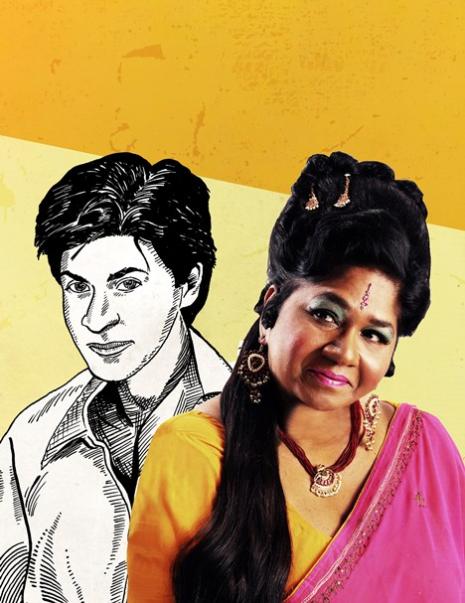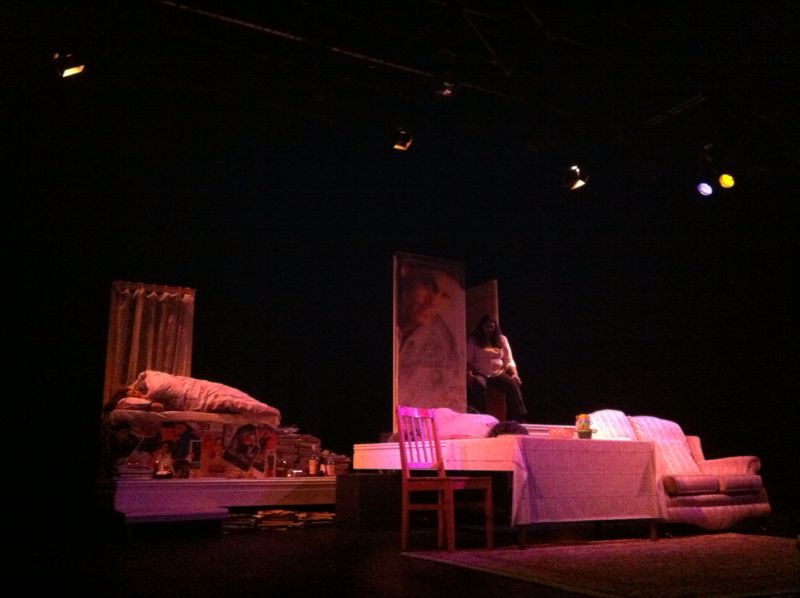'If Only Sharukh Khan', a play by Raani Moorthy, premiered in London yesterday, November 27th. Framed around three characters' love of the Bollywood actor, Shahrukh Khan, the play allows the audience enter the lives of three South Asian women including a former member of the LTTE.
Watching the premier last night and reviewing the play for Tamil Guardian, was Sinthujan Varatharajah... |
Three South Asian women share their love for actor Sharukh Khan. One more obsessed than the other, they developed a passion for spending countless hours discussing their favourite actor-come-demi-god in their secretive fan club. Rose, Pindy and Kasi, all mid-aged women, have shared a three bedroom house in Britain for more than 25 years, where their three-person fan club was founded and remains headquartered.
Though they have grown to become friends, family and even lovers within these long years, sharing all kinds of intimacies and privacies, they have now reached their individual points of saturation - of each other, themselves and their lives caught between a constant swing of melancholia and trauma. Sharukh Khan bridges their divides and stretches their imaginations, though, even in their obsessive love, there are differences. Indeed, the actor means different things to all three women and evokes contrasting reactions amongst Rose, Pindy and Kasi. What Khan, however, universally does, is fill their lives emptied of motion and drowned in fatigue with meaning. Khan opens for each of them a window and journey to a repressed past.
Rani Moorthy, the creative director, writer, producer and main actress of the play, has brought with, If Only Sharukh Khan, a comedic, but more so emotive, tragic and complex drama on diasporic memories, trauma and violence to stage. If Only Sharukh Khan is an intimate ode to postcolonial people, particularly postcolonial women and their many stories of suffering, survival and resilience. These stories of South Asian women of different shade, seize and origin are tied together by a shared affection for a famous man, who, however, serves little more than the role of a projection screen for their unfulfilled desires and unprocessed herstories.
If Only Sharukh Khan may invite, in fact deceive its audience to light-hearted entertainment surrounding an Indian idol, but Moorthy delivers something far more sombre and far less bollywoodesque. Neither its music, setting, costumes nor heartfelt welcome with chai and banter can hide from the profound political journeys we are invited on during these 90 minutes together with Rose, Pindy and Kasi. Sharukh Khan enables these three women and importantly the audience to revisit bombings in Jaffna, mob violence in Kampala and a racist murder in Nairobi. If only Sharukh Khan playfully dwells in the underbelly of postcolonial history and its violent trajectories that have brought all three South Asian women by way of Nairobi to London to create a diaspora of lonely, traumatized brown-skinned women.
With her new play, Moorthy, a Tamil artist of Jaffnese origin, additionally attempts to reenact something rarely seen in the British Asian arts industry: she places the unsettling stories of Eelam Tamils, often confined to the margins of mainstream British Asian consciousness, to its centre. Kasi, the former Tamil Tigress played by Moorthy, has forgotten her own name and lives as a ghost in the shadows of her former self. Her leading presence in the play, her repeated moonlight reminiscence of a violent past in a distant land, serve thereby as a clear challenge, disturbance and interruption of the many Hindi and North Indian centric cultural references made. With Kasi trying in vain to remember more than her nom de guerre, Moorthy successfully interrogates a marginalized Asian past, and through Kasi's work as an asylum case officer also present. She thus artfully opens up a horizon beyond the dominant narratives and forms of representation of Asianess in the UK. With Moorthy’s creative work, Tamil narratives have found artistic spaces to be mainstreamed in British (Asian) cultural productions and become accessible, visible and audible to audiences, who may otherwise never have the chance or interest to encounter the South Asian Other.
For Tamils in the diaspora, this play may be an important step to experience and seek more spaces for representation and visibility of our presence in the heart of Empire.
If Only Sharukh Khan can be seen on stage until November 30 in South Ealing, London.
 |
Sinthujan Varatharajah is the founder of Roots of Diaspora and a PhD student in Political Geography at the University College London, University of London. Follow him on twitter @varathas.
